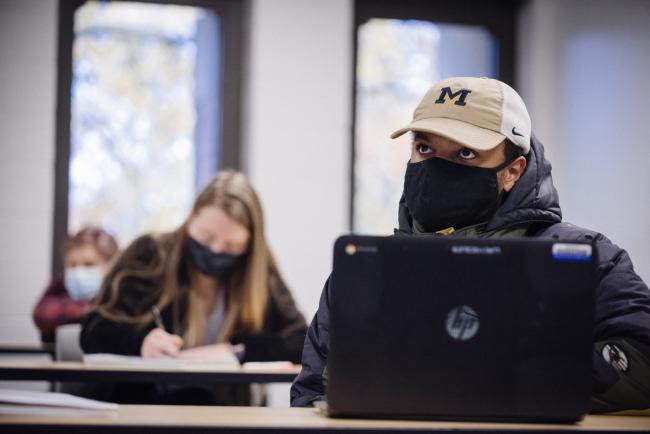Jan. 31, 2022, GRAND RAPIDS, Mich. – The University of Michigan’s College of Literature, Science, and the Arts is expanding efforts to recruit and retain humanities students from Grand Rapids Community College and two other community colleges.
U-M’s Transfer Bridges to the Humanities@Michigan program received a $3.4 million grant from the Andrew W. Mellon Foundation to partner with GRCC and Henry Ford and Schoolcraft colleges.
As the state government works to make community college free through the Michigan Reconnect and Futures for Frontliners programs, U-M is preparing to serve community college students in new ways, building pathways that support students before, during and after they transfer to Ann Arbor.
The grant, a renewal of $1.6 million in funding received in 2018 to establish Transfer Bridges, is one of the ways U-M and its College of Literature, Science, and the Arts are working to create a more diverse and inclusive student community reflecting the state’s population, creating an opportunity for more nontraditional students and for students from underrepresented communities and low-income households to attend.
“We are excited to receive this grant from the Mellon Foundation and continue our efforts to bring transfer students to U-M,” said Tim McKay, associate dean for undergraduate education at LSA. “This grant lays the foundation on which we’re building a larger partnership with all 28 public community colleges across Michigan. Students may start their educational journey at community college for a number of reasons, but Transfer Bridges shows that the journey to the University of Michigan is not impossible. In fact, it is just the opposite. They have what it takes to be successful here and this program makes that path open.”
Transfer Bridges is designed for students at community colleges who are majoring in the humanities and want to transfer to the University of Michigan to complete a bachelor's degree. The program prepares them for academic and community life at U-M, with dedicated mentorship, advising tailored to their academic needs, learning and social experiences, faculty connections, and the financial support needed to help them earn their degree.
Sheila Jones, GRCC’s dean of Instructional Support, said she is excited about how this grant will benefit GRCC students in providing a more seamless transfer bridge to U-M’s College of Literature, Science, and the Arts.
“Our college has a longstanding connection to the University of Michigan, dating back to GRCC's founding,” she said. “We are grateful to the Mellon Foundation for recognizing this partnership as well as the need to provide the support that this program offers to community college students pursuing degrees in the humanities and social sciences. I'm proud of the work that our faculty and staff have been doing with this program over the last few years and am looking forward to expanding it so that we can impact more of our students.”
The new funding from the Mellon Foundation will support paid, high-impact learning experiences for humanities students during the summer, including undergraduate research, internships, and service-based learning projects, while they are still enrolled in community college. The program currently provides academic opportunities through three LSA-based units: the Undergraduate Research Opportunity Program, optiMize, and the Engelhardt Social Justice Fellowship.
For many community college students, finances can be an obstacle when transferring to a four-year institution. Transfer Bridges aims to alleviate that strain through these paid learning experiences, and to connect students with financial aid resources such as the Go Blue Guarantee.
“My primary reasons for attending a community college first were financial freedom and family,” said Yasmeen Berry, a third-year student who transferred to U-M from Henry Ford College. “I am the child of Lebanese immigrants and have close familial ties to my hometown. The Transfer Bridges program is what made my transition to the University of Michigan possible. The incredible coordinators associated with it are genuinely invested in students’ success. Ultimately, through the opportunities provided as part of the Transfer Bridges program, I have gained and continue to attain valuable experiences with my mentors that will forever shape my future career.”
Transfer Bridges’ successful outcomes are a testament to how providing access and support can make the lasting difference for students looking to transfer to U- M. As of fall 2021, 100% of program participants who applied to U-M were admitted and decided to attend. Since the launch of Transfer Bridges, no program participants have withdrawn from U-M, which exceeds the retention rate of traditional first-year students at the university.
“One of the reasons why (transfer) students don’t apply is because they assume they won’t fit in,” said Nick Turinsky, transfer recruiting coordinator for the LSA Transfer Bridges program. “Our program is designed to dismantle that belief and break down those feelings of self-doubt. We know they are more than capable to thrive at U-M, and we have seen the results. They just need to see themselves here.”
Additional information about Transfer Bridges to the Humanities@Michigan, is here.
